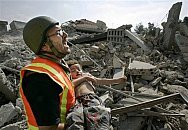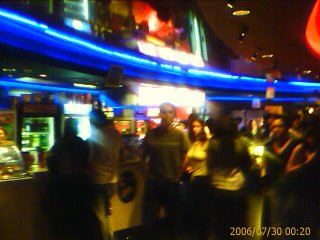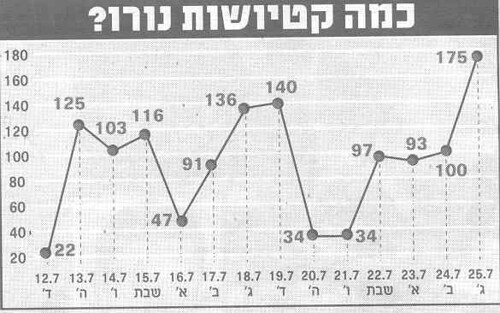
Leader in the July 20 edition of the The Economist magazine
The war that has just erupted apparently without warning between Israel and Lebanon looks miserably familiar. The wanton spilling of blood, the shattering of lives and homes, the flight of refugees: it has all happened in much the same way and just the same places before. In 1982 an Israeli government sent tanks into the heart of Beirut to crush the “state within a state” of Yasser Arafat and his Palestine Liberation Organisation. A quarter of a century later, Israel's air force is pulverising Lebanon in order to crush the state within a state established there by Hizbullah, Lebanon's Iranian-inspired “Party of God”. That earlier war looked at first like a brilliant victory for Israel. Arafat and his men had to be rescued by the Americans and escorted to exile in faraway Tunis. But Israel's joy did not last. The war killed thousands of Palestinian and Lebanese civilians, along with hundreds of Israeli and Syrian soldiers. It brought years of misery to Lebanon—and, of course, no peace in the end to Israel. The likeliest outcome of this war is that the same futile cycle will repeat itself.
Why it startedAs in 1982, it started with a pinprick. Then, it was a Palestinian assassination attempt on an Israeli diplomat in London. This time it was the decision of Hizbullah's leader, Sheikh Hassan Nasrallah, to send his fighters on a cross-border raid into Israel on July 12th, where they killed several soldiers and captured two. This was, as Israel complains, an unprovoked attack on its sovereign territory. Israel says the timing—three days before the G8 summit in St Petersburg—was no coincidence, that Iran was using Hizbullah to deflect attention from its fishy nuclear programme. An equally plausible explanation is that the war is the product of a mistake.
In launching his raid Mr Nasrallah was in fact doing nothing new. In recent years, Hizbullah has mounted several similar raids into Israel. It got away with them, even when Israel was led by Ehud Barak and Ariel Sharon, tough prime ministers who had been war heroes too. Their reactions were astonishingly mild. The reason for this, as Mr Nasrallah constantly boasted, was his arsenal of around 12,000 Iranian and Syrian rockets and missiles. With these as a deterrent, Mr Nasrallah felt free to pursue an intermittent cross-border war against his much stronger neighbour, piling up prestige for resisting the Zionist “occupier”—even though, in point of fact, Israel withdrew from all of Lebanon's territory six years ago, and has a certificate from the United Nations to prove it.
This time, too, Mr Nasrallah may have expected the usual tokenistic response. If so, he miscalculated. Shortly before the Hizbullah raid carried away two Israeli soldiers, the Palestinian Hamas movement had mounted an equally daring raid into Israel from the Gaza Strip (another place from which Israel had completely withdrawn), killing two soldiers and nabbing another. Perhaps precisely because his non-military background required him to look strong, Israel's new prime minister, Ehud Olmert, decided that this double humiliation was more than he could survive or Israel could bear. So he has chosen to go to war (see
article).
To much of the world, that looks like a crazily disproportionate response. And so it is, measured against the offence. But measure it against the threat that Israel feels from Hizbullah and it may not be. From that perspective, this war did not spring from nowhere, even if its timing is an accident. The conditions for it have been building, in slow motion, for years.
In the decades since Israel's invasion of 1982, Hizbullah has emerged as the strongest local military force in Lebanon. Since last year, when Lebanese public opinion and forceful diplomacy pushed out the Syrians, it has been the strongest force, period. It certainly cannot be disarmed, as Israel says piously it should be, by the official Lebanese army. And Hizbullah has shown little interest in Security Council Resolution 1559, which calls equally piously for the disbanding of all Lebanon's militias (there is in fact now only one) but suggests no way of enforcing this. Hizbullah is a political party, with representation in Lebanon's parliament and government, but its militia does not take orders from that government. It almost certainly pays more attention to the ideological and tactical advice it receives from Iran, its chief armourer and mentor.
The untidy political arrangements of its neighbour might be of no interest to Israel but for the fact, now being underlined daily in fire, that by giving Hizbullah all those rockets and missiles Iran has transformed a small militia into a strategic threat to the Jewish state. None of the strong states on Israel's border, such as Egypt or Syria, would dare to plaster Israel's towns and cities with rockets. A non-state actor such as Hizbullah, inside a weak state such as Lebanon, is much less easy to deter. Hizbullah retorts that it needed all these weapons as a deterrent of its own. Israel did after all invade Lebanon and occupy bits of it for 22 years. But it was utter hubris for Hizbullah to believe that, with its rockets in reserve, its fighters could keep crossing into Israel with impunity.
How to end it
A war that starts by accident is not necessarily easy to end. This one is what Israelis call a “war of choice”. Mr Olmert did not have to react the way he did. But now that he has, the stakes could hardly be higher for both sides. It is no longer a matter of wounded pride or the fate of the kidnapped soldiers.
If Hizbullah is beaten, it risks losing its position as the strongest power in the fractious Lebanese state, with damaging consequences in the region for its Iranian sponsor and Syrian ally. If Israel falters, many of its people think, the iron wall of military power that has enabled it to win grudging acceptance in the Middle East will have been seriously breached.
It is because the stakes are so high that both sides have rushed so fast up the ladder of escalation. Israel's aim is not just to even the score by hurting Hizbullah and then stopping. Before stopping, it says, it wants to deprive Hizbullah of its power to strike Israel in future. That means destroying Hizbullah's rocket stores even if they are concealed in villages and bombing its command bunkers even if they are located under the crowded residential suburbs of south Beirut. It also means cutting off Hizbullah's resupply, even if the subsequent blockade by land, sea and air brings Lebanon's economy to its knees. If hundreds of civilians are killed, and hundreds of thousands put to flight, so be it: in war, under Israel's philosophy, moderation is imbecility. Hizbullah is no different, and in some ways worse. The “open war” declared by Mr Nasrallah consists chiefly of firing rockets indiscriminately into Israel's towns. Israel says it is killing civilians by accident, but the disparity in firepower means the Lebanese still suffer much more.
This is madness, and it should end. It is madness because the likelihood of Israel achieving the war aims it has set for itself is negligible. However much punishment Mr Olmert inflicts on Hizbullah, he cannot force it to submit in a way that its leaders and followers will perceive as a humiliation. Israel's first invasion of Lebanon turned into its Vietnam. It is plainly unwilling to occupy the place again. But airpower alone will never destroy every last rocket and prevent Hizbullah's fighters from continuing to send them off. No other outside force looks capable of doing the job on Israel's behalf. At present, the only way to disarm Hizbullah is therefore in the context of an agreement Hizbullah itself can be made to accept.
George Bush is in no rush to rescue Hizbullah. And why, he must wonder, should he? This organisation killed hundreds of American marines in 1983. It is part of an alliance, consisting also of Iran, Syria and Hamas, working against America's interests and friends. Pro-American governments, such as Egypt and Saudi Arabia, bluntly blame Hizbullah for this latest wasteful war. Israel is asking for more time, perhaps another week or two, to complete its demolition of Hizbullah's arsenal and create a new order in Lebanon. Though Condoleezza Rice, Mr Bush's secretary of state, says she is bound for the region, there is no concealing the American temptation to dawdle.
That is a mistake. Hizbullah cannot be uprooted. It is not going formally to surrender. Its past struggle against Israel has won it the fierce loyalty of many Lebanese Shias, and its present one will add to their number even if it comes off worse. Israel's security will not be enhanced by destroying the rest of Lebanon. By weakening the Lebanese state, and its fragile but well-intentioned government, Israel just weakens the already feeble constraints Lebanon tries to impose on Hizbullah's actions.
What is needed now is a way for both sides to climb down. Israel must get its soldiers back, Hizbullah's departure from the border area and an undertaking that Hizbullah will not attack again. The Lebanese army or a neutral force should then man the border. Hizbullah needs to be given a way to consent to these changes without losing face. Squaring this will take time, ingenuity and the full engagement of the United States. It will not bring peace to the Middle East but it might silence a dangerous new front. America should start its work at once.














